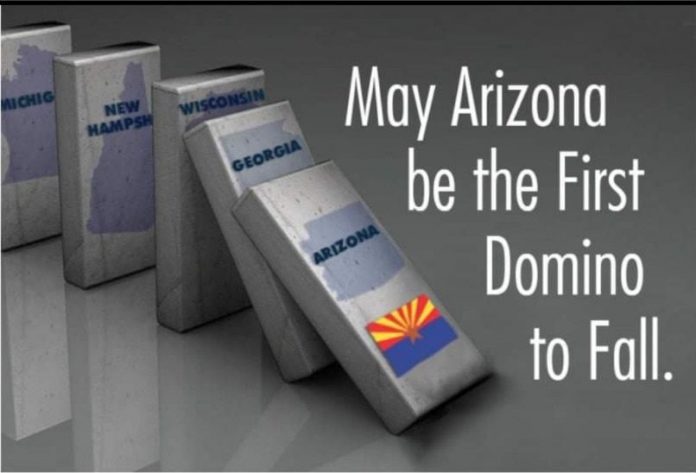In a landmark ruling on Monday, an Arizona judge declared that portions of the Democrat Secretary of State’s Election Procedure Manual (EPM) for the upcoming 2024 elections are unconstitutional.
This decision comes as a significant victory for conservative groups and election integrity activists who have long argued that the manual suppresses their ability to speak out against voter fraud.
The case was brought forth by the Arizona Free Enterprise Club, along with individual plaintiffs including Philip Townsend and the America First Policy Institute.
They contended that the EPM imposed overly broad and vague restrictions on speech, particularly targeting those who raise concerns about election integrity.
The court’s ruling, issued by Judge Jennifer Ryan-Touhill, specifically targets Chapter 9 of the EPM, which outlined rules meant to preserve order and security at voting locations.
The plaintiffs contended that these rules, which included prohibitions on “harassment” and “intimidation” within and outside of polling locations, were vague and overly broad. They argued that such restrictions could be weaponized to silence voters and activists who sought to expose potential election fraud.
Judge Ryan-Touhill agreed with the plaintiffs, stating that the language in the EPM was not only too vague but also expanded criminal liability in a way that could infringe upon free speech rights guaranteed by the Arizona Constitution.
The judge highlighted that many of the prohibited actions, such as raising one’s voice or using “offensive language,” are protected forms of expression. The ruling emphasized that the government’s interest in maintaining order at polling places does not justify the suppression of free speech.
According to the ruling reviewed by The Gateway Pundit:
The Court is troubled by section III, “preserving order and security at the voting location.” From pages 180 to 183, the EPM contains what this Court finds to be speech restrictions in violation of our Arizona Constitution, misstates or modifies our statutes, and fails to identify any distinction between guidance and legal mandates. The Court will highlight those portions of chapter 9 it finds troubling, impermissible or, in context, authorizes impermissible limitations on the public:
• [N]o electioneering may take place outside the 75-foot limit if it is audible from a location inside the door to the voting location.
• Any activity by a person with the intent or effect of [ ] harassing, [ ] (or conspiring with others to do so) inside or outside the 75-foot limit at a voting location is prohibited.
• The officer in charge of elections has a responsibility to train poll workers and establish policies to prevent and promptly remedy any instances of voter intimidation.
• The officer in charge of elections should publicize and/or implement the following guidelines as applicable:
• The inspector must utilize the marshal to preserve order and remove disruptive persons from the voting location.
• Openly carrying a firearm outside the 75-foot limit may also constitute unlawful voter intimidation, depending on the context.
• Aggressive behavior, such as raising one’s voice or taunting a voter or poll worker.
• Using [ ] insulting [ ] or offensive language to a voter or poll worker.
• Disrupting voting lines.
• Following voters or poll workers coming to or leaving a voting location, including to or from their vehicles.
• Intentionally disseminating false or misleading information at a voting location. . . .
• Directly confronting, questioning, photographing, or videotaping voters or poll workers in a harassing [ ] manner, including when the voter or poll worker is coming to or leaving the polling location.
• Asking voters for “documentation” or other questions that only poll workers should perform.
• Raising repeated frivolous voter challenges to poll workers without any good faith basis, or raising voter challenges based on race, ethnicity, national origin, language, religion or disability.
• Posting signs or communicating messages about penalties for “voter fraud” in a harassing or intimidating manner.
[…]
IT IS ORDERED declaring chapter 9, section (III)(A)-(D) of the 2023 EPM unenforceable.
Via Behizy:
BREAKING: A judge in Arizona just ruled that portions of the Democrat Secretary of State’s election procedure manual for the 2024 election are UNCONSTITUTIONAL for silencing election integrity activists who sound the alarm on fraud
According to the judge, certain provisions in… pic.twitter.com/fgiv1s3egR
— George (@BehizyTweets) August 7, 2024
More from Democracy Docket:
The plaintiff is also challenging part of the EPM that requires political parties to open their primaries to federal-only voters (these are voters who can only vote in federal elections because they have not provided documentary proof of citizenship) who are not registered with a state party by arguing that this provision violates the First Amendment. Additionally, the lawsuit argues that the EPM contains unconstitutionally vague criminal offenses. As a result, the plaintiff asks for the EPM’s challenged rules to be struck down.
Arizona is already a hot spot for election litigation with three lawsuits challenging the EPM filed by anti-voting groups including the Republican National Committee and Republican legislators over the last several weeks. In addition to challenges to the EPM, a right wing legal group founded by Stephen Miller also filed a lawsuit last week challenging Maricopa County’s election practices.
For more details on this ruling, you can access the full document here.
You can read the Election Procedure Manual here.
The post Arizona Judge Declares Key Portions of 2024 Election Manual Unconstitutional, Siding with Election Integrity Advocates appeared first on The Gateway Pundit.
This article may have been paraphrased or summarized for brevity. The original article may be accessed here: Read Source Article.









